In this edition of The New Indian’s new show India Abroad, US Congressman Shri Thanedar opens up about his remarkable journey from a janitor in Maharashtra’s Belgaum to a Indian icon in America, his love for Vedas and Yoga, and his efforts in advocating for the Hindu community, in an exclusive interaction with Executive Editor Rohan Dua at his home sprawling home in Detroit, Michigan. From his humble beginnings as a chemical engineer to becoming a member of the US House of Representatives, Thanedar’s commitment to progress and social change shines through his words.
Question: From a small village in Belgaum to a Congressman in the US, what does this sense of gratification mean to you as we approach another election?
Answer: This is an incredibly exciting moment for me. I arrived in the US as a student at the age of 24, seeking to uplift my family from poverty back in India. Witnessing the opportunities and blessings this country has bestowed upon me, I felt compelled to serve the American people.
Q: Your journey encompasses diverse experiences, from being a chemical engineer to a member of the US House of Representatives. If we were to distill your path into a scientific formula, what would be its key element?
A: The key element is: Never Give Up no matter how hard things may get. Set your goals and work hard.
Q: Among the languages you speak, Hindi, Marathi, and English, which one holds the closest place in your heart?
A: Marathi holds a special place in my heart because my mother spoke Marathi. I interacted with her in Marathi because she could only speak Marathi.
Q: Your campaign emphasized that “Science is on the ballot”. Why do you believe science should play a pivotal role in political decision-making, and what political experiment would you like to test?
A: Politics often relies on emotions, but it is crucial to shift the focus towards facts, data, and the truth. The decisions made during the Covid pandemic, for example, should have been based on factual evidence rather than emotions.
Q: How did you contribute to tackling the Covid crisis?
A: At that time, I served as a state representative (equivalent to an MLA in India) in Michigan. I worked at the state level to ensure that the people in Detroit received the necessary medications and assistance. Detroit, facing poverty and racism, was significantly affected by the pandemic.
Q: Your strong stance on bringing a bill for PhD students has evoked strong emotions. Could you elaborate on this?
A: The United States requires highly-skilled engineers and scientists, many of whom come from India. After discussions with CEOs of leading companies, it became evident that these scientists are essential for business growth and innovation. My proposed bill aims to provide easier pathways, such as H1B visas or green cards, for PhD scientists.
Q: As a prominent figure not only for Indians but also for Hindu Americans, you organized the Hindu-American Summit at Capitol Hill. Can you share your experience and the highlight of the summit?
A: I firmly believe in religious freedom and noticed unprovoked and unwarranted attacks on Hinduism. After my election, I realized that never was there a Hindu caucus in the 250 years of the US Congress. So I took the initiative to form one. Today, we have a caucus representing Hindus, Sikhs, and Buddhists.
Q: How do you anticipate the support of political advocacy groups and members of your party in this initiative?
A: While some members of Congress may continue to exhibit Hinduphobia, I expect substantial support from the majority. I have invited both Democrats and Republicans to join the Hindu caucus and expect its membership to grow in the coming days.
Q: What steps do you think should be taken to combat racism, particularly in light of attacks on people of Asian descent in the US?
A: Given that 78% of Detroit’s population consists of African Americans who have faced significant racism, I decided to run for public office to protect and uplift them economically. I will fight to ensure that US laws effectively combat racism and hate.
Q: The issues faced by the Hindu community are diverse, including attacks, temple land encroachment, and restrictions on their faith in institutions. How do you plan to address these challenges?
A: There exists a great deal of misunderstanding surrounding Hinduism. People fail to realize its peaceful nature and the Bhagavad Gita’s message of harmony. The formation of the Hindu caucus aims to educate and spread awareness. Additionally, events featuring prominent figures like Sri Sri Ravi Shankar in Washington DC will contribute to this cause.









